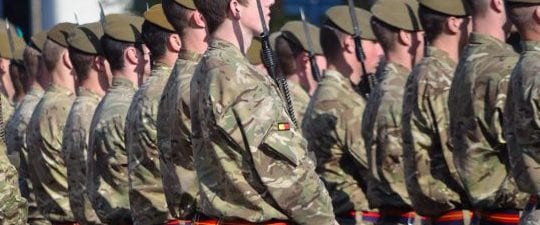Our military personnel and veterans are a source of national pride and collective gratitude.
We rely on these men and women who dedicate themselves to a career in the Armed Forces. Quite justifiably, they’re frequently praised for their stoicism and loyalty.
Yet, as an expert in military law, I frequently find this same stoicism and loyalty can work to their detriment as I believe it explains the unwillingness to make a civil personal injury claim..
DON’T LEAVE IT TOO LONG TO PURSUE LITIGATION
These inherently reluctant litigants often wait until long after they’ve hung up their uniforms before considering taking legal advice over injuries sustained during military service. In the case of some veterans, that wait spans many years, resulting in their cases becoming ‘statute barred’ – in other words, too late to pursue.
We could regard such fortitude as a fabled breath of fresh air. After all, there is a perception we live in litigious times, when the mildest suggestion of hurt feelings blows open the gateway to civil action. So, it’s refreshing to know there are some who put `duty` before personal needs.
LEFT TO SUFFER WITHOUT COMPENSATION
Sadly, this noble hypothesis often comes at a price due to The Limitation Act. In civil personal injury claims, court proceedings must generally be commenced within three years from the date of accident or from the date of legal knowledge (that the claimant had significant injuries due to actions/inaction of the third party).
Therefore, many military personnel who delay seeking legal redress for the noblest of reasons are left to suffer the consequences of injuries sustained in service. They do this without compensation and/or rehabilitation we could otherwise secure for them.
It’s open to a claimant who seeks to belatedly pursue a claim to apply to the court to waive the three-year time requirement. Indeed, I have successfully pursued such applications numerous times (under Section 33 of the Limitation Act). However, success in such applications is far from guaranteed and claimants shouldn’t rely on the mercy of the courts.
INJURIES GO UNCOMPENSATED
In the last three months alone, I’ve had to regretfully reject seven otherwise good claims due to injured parties having delayed more than three years before seeking legal advice. One prospective claimant was 33 years too late! Another who had potentially good claims for NFCI (non-freezing cold injury), NIHL (noise-induced hearing loss) and a back injury, delayed seeking legal advice until it was confirmed he would be medically discharged due to his injuries. This was many years after he had sustained the injuries as reflected in his military medical records.
OTHER REASONS WHY MILITARY PERSONNEL DELAY THEIR CLAIMS
Regimental loyalty is only one reason that explains the reluctance to make a claim.
Some military personnel want to believe they will get better and wish to avoid medical downgrading or medical discharge. This leads them to try to hide their injuries and symptoms.
Others don’t report injuries/pursue claims as they want to avoid bullying or harassment – something which tragically can be rife in the military and seems to be visited most frequently upon ‘Commonwealth soldiers’ suffering from NFCI (non-freezing cold injuries).
Indeed, several of my NFCI clients have reported disturbing, seemingly racially-motivated bullying and harassment generally from peers or low-ranking, generally non-commissioned officers. Such treatment can then form part of the claims.
PRACTICAL CHALLENGES THAT CAN DELAY A CLAIM
There are other practical challenges too. For those involved in long tours abroad, accessing a solicitor can be difficult.
Another issue can be the lack of independent evidence – perhaps driven, at times, by witnesses’ unwillingness to help for reasons of self-preservation. Particularly those who continue to serve.
A PERVASIVE MYTH TO DISPEL
Above all, even amongst those prepared to begin legal action, there`s an enduring urban myth that they cannot pursue claims whilst still serving. Indeed, in the past, some members of the armed forces have suggested to me that they were expressly so misinformed.
For those on `civvy street`, pursuing a claim for an injury at work is rarely regarded as a reflection of poor character or lack of stamina. Rather, it’s a fair and just response to an accident or disproportionate physical stress. It shouldn’t be different for our servicemen and women.
MILITARY PERSONNEL HAVE THE SAME RIGHT TO COMPENSATION AS OTHER PROFESSIONALS
We may expect the military to show grit, endurance, courage, and resilience in the course of duty. But equally, they shouldn`t be left to rely on such qualities when they have every right to make a claim. Particularly when, for them, the consequences of injuries can be all the more severe and debilitating.
Let’s be clear, the right to compensation for injuries suffered at a place of work apply to everyone, regardless of industry.
If you’ve been injured in an accident and you want to discuss your case with Gary, call us today for a no obligation consultation on 0161 930 5117 or email armedforces@gorvins.com

